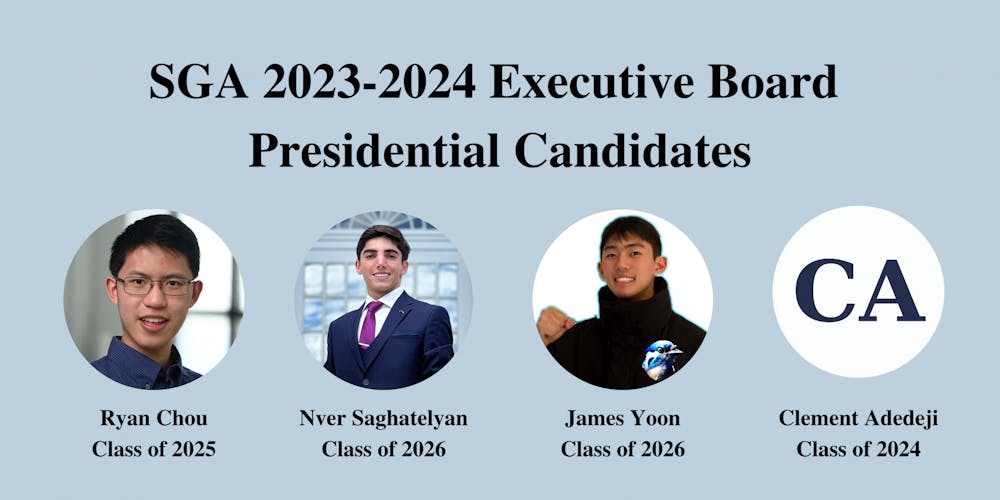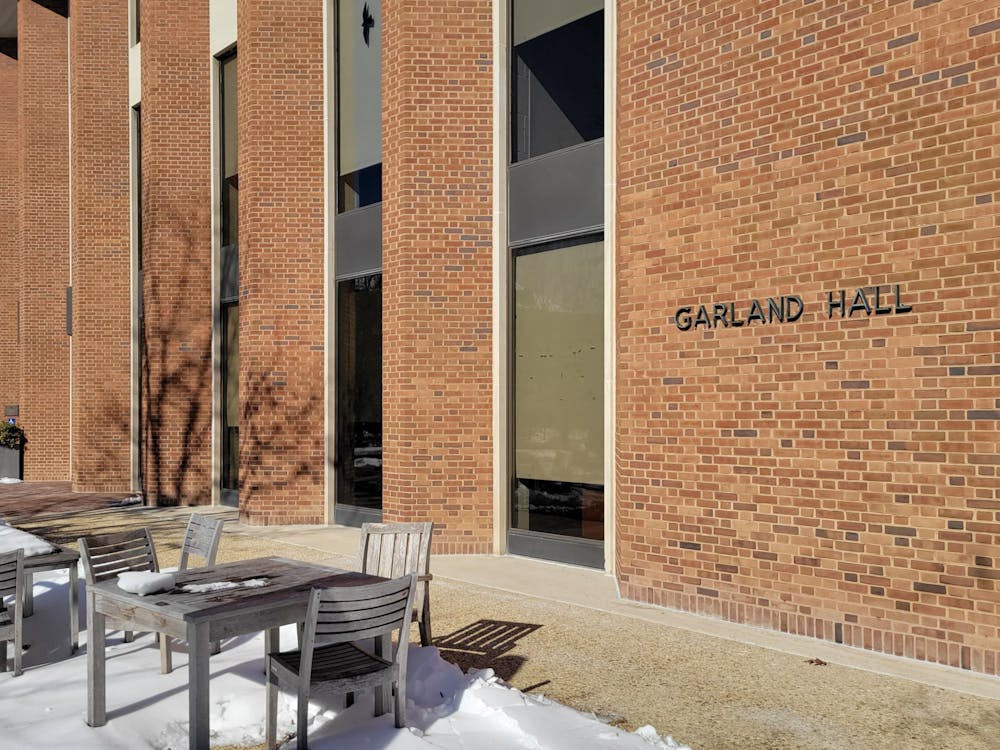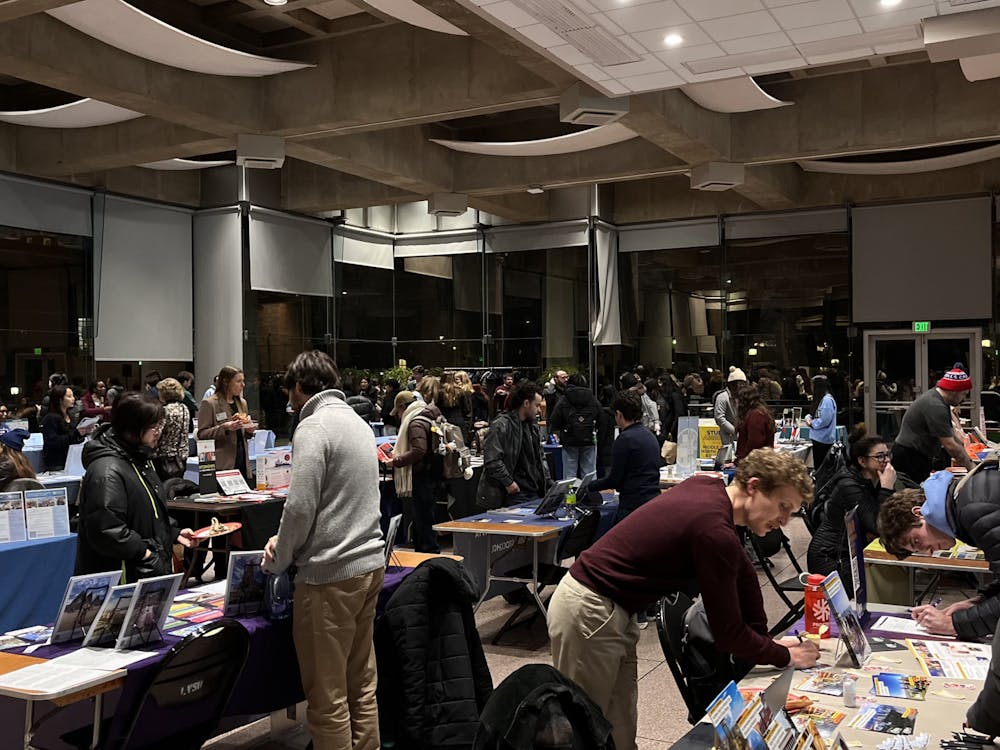Candidates for the 2023–24 Student Government Association (SGA) Executive Board elections include a single ticket and five independent candidates. The SGA Executive Board debate will be held on March 9, and voting will be open from March 14 to 15.
Four candidates are running for student body president: freshman Nver Saghatelyan, freshman James Yoon, junior Clement Adedeji and current sophomore Class President Ryan Chou. There are two candidates running for the chair of programming, a new position established this year: junior Class Senator Shalala Leny and freshman Class Senator Alisa Fedotova. Current sophomore Class Senator Jackson Morris and current freshman Class Senator Amy Li are running for the positions of vice president and secretary, respectively. Two candidates are running for treasurer: current junior Class Senator Jenny Chen and freshman Class Senator Sean Li.
Race for the executive presidency
In an email to The News-Letter, Chou described his platform, stressing that he has shown dedication to SGA.
“I’ve now served as the sophomore class president for two years,” he wrote. “While I will not argue that the experience makes me a better candidate — I’ve seen many less experienced representatives outperform their experienced counterparts — my past work should serve as an indication of my commitment to improving both our community and SGA.”
Chou highlighted the recommendations he presented to SGA’s current executive branch and his commitment to helping SGA establish transparency and improve outreach. Chou added that he plans to improve SGA’s relationship with three main entities: the student body, university administration and other representatives.
Chou argued that many of his goals for relationship-building are possible within a short period of time.
“Much of this is attainable within a few months, possibly even weeks,” he wrote. “As I have demonstrated in my roles as the president of the 2025 class council and a senator of the legislative branch, many of these goals are attainable with time and effort.”
In an email to The News-Letter, presidential candidate Saghatelyan voiced that the impact of SGA is often overlooked despite its position as a crucial conduit for student interests.
“I will work to ensure that the SGA has a seat at the table in university leadership, starting by advocating for a SGA seat on the Sustainability Leadership Council to establish a direct channel for student input on sustainability issues,” he wrote. “By prioritizing the SGA’s role in university leadership, we can create a more inclusive and collaborative campus community that better serves the needs of all students.”
Saghatelyan proposed monetary policies, such as increasing funding and promotion for need-based scholarships and grants and establishing a more transparent and equitable funding allocation process for student organizations; specifically, he pointed to multicultural student organizations to promote diversity.
He also emphasized his commitment to providing solutions for common problems faced by students, such as improving transportation options and expanding collaboration among students and other universities.
“With your support, I am confident that we can unite as one Johns Hopkins University community to pave the way for the realization of my platform and create a more equitable and inclusive campus environment for all students,” he wrote.
Presidential candidate Yoon described the inspiration behind his “#TheResistance” campaign in an email to The News-Letter.
“After seeing disappointing efforts to improve our lives on campus, I take courage to ask: Who has Johns Hopkins been changing for? Every day, students like me struggle with mental health issues, food poisoning, dorm stress and safety concerns,” he wrote. “It is time to realize that the rise in college rankings and the stacks of research funding do not represent what Hopkins is all about.”
Yoon plans to run in support of food accountability, improved student rights and mental health reform. He suggested that he is willing to cause trouble for the sake of the student body.
He added that he plans to take small problems seriously.
“I will fight for ordinary students who are having ordinary problems,” he wrote. “It is not always about the big picture. SGA’s focus needs to be on making little differences to make everyone’s lives a little better than yesterday.”
Presidential candidate Adedeji described his platform in an email to The News-Letter.
“To keep it short and sweet, I think we have an amazing campus and would like to help our school’s journey on the upward trend it is currently on,” he wrote. “The major things that I believe to be of use to the campus are helping students integrate more with one another to create a cohesive student body as well as increasing the value that Hopkins imbues into the greater Baltimore community.”
Race for executive chair of programming
In an email to The News-Letter, Leny shared that she found planning on-campus events to be the most enjoyable experience as a senator.
Leny has previously taken part in planning the Second-Year Garden Party and Nightclub event. Looking ahead, she proposed plans to host an easter egg hunt in April and more school-wide events, such as a field day where classes compete against each other.
“I hope to be able to offer essential accommodations for future events to increase accessibility for more students,” she wrote. “I hope that together we can revitalize our on-campus culture while navigating this new post-COVID era!”
Fedotova, also a candidate for the executive chair of programming, claimed that, as an incumbent senator, she has seen the positive impact that well-planned events can have on the student body. The candidate plans to increase the visibility and accessibility of events by active promotion and events that reflect diverse backgrounds, such as cultural festivals.
Fedotova wrote, “I am committed to creating engaging, educational and entertaining events that are accessible to all students and represent a variety of cultures. I look forward to creating memorable experiences that will diversify our academic journeys.”
Race for the vice presidency
In an email to The News-Letter, Morris, running for vice president, outlined his platform, which focuses on similar goals to Chou’s.
“I want to improve the relationship between students, staff and faculty at JHU,” he wrote. “Most ambitious SGA initiatives rely on a level of support from either faculty or staff (such as staff/faculty DEI training, disability accommodation training), and allowing students to get the most out of Johns Hopkins means giving students direct input on the policies that will most affect us.”
Race for secretary
Amy Li, running for secretary, wrote about her current and past experiences in leadership roles, including at her hometown’s Mayor Youth Engagement Council and as a freshman class senator in SGA, in an email to The News-Letter.
Amy Li highlighted her main goals as secretary.
“My primary goals as secretary are preserving the legacy of SGA’s graduates and creating an SGA that endures past one senate,” she said. “To achieve these goals, I will collaborate with the rest of SGA to establish structures to facilitate easier transitions into the SGA roles in all three branches and create efficiency in educating SGA members.”
Race for treasurer
Sean Li is running for treasurer. In an email to The News-Letter, he recognized SGA’s lacking financial transparency.
“Many constituents have asked questions such as, ‘What exactly does SGA do?’ or ‘What occurs during the weekly meetings?’” he said. “On the financial side, members of several clubs have also expressed a desire to know more about how funding allocation is conducted and how they can request additional funding.”
Sean Li added that, regardless of whether clubs receive funding from SGA, he will work with club leaders to guide them toward obtaining sufficient funding.
In an email to The News-Letter, Chen described her platform, detailing her experience working in the finance committee for the last three years.
“As Treasurer, I want to provide organizations ample opportunity to reach out to me in regards to their concerns about funding so I plan to hold more frequent in-person and online office hours along with setting stricter rules for response times for both members of the finance committee, and for the Chair and the Treasurer,” she wrote.
Chen highlighted how she will make clubs better aware of the resources available from SGA by sending out more consistent announcements throughout the semester and holding workshops for budgeting and applying for funding. She also added that she will promote the use of a form for any joint-collaboration events with SGA, so clubs can put on larger-scale events with a larger budget.
Editor’s Note: This article was updated to add Jenny Chen’s comments.





